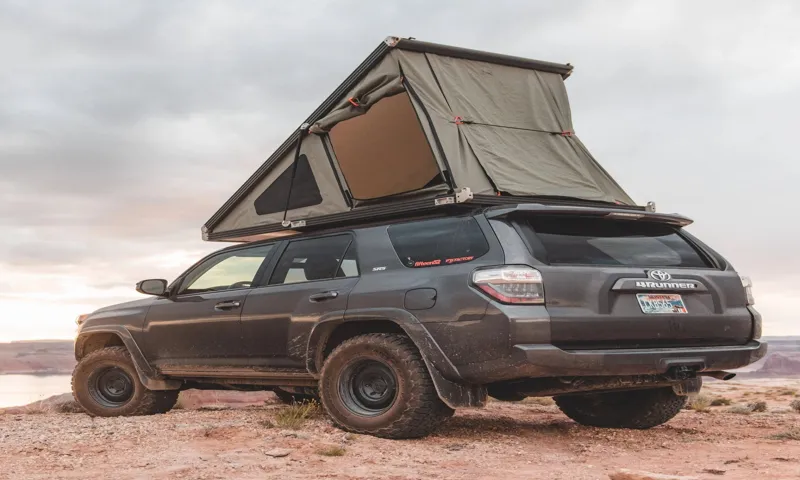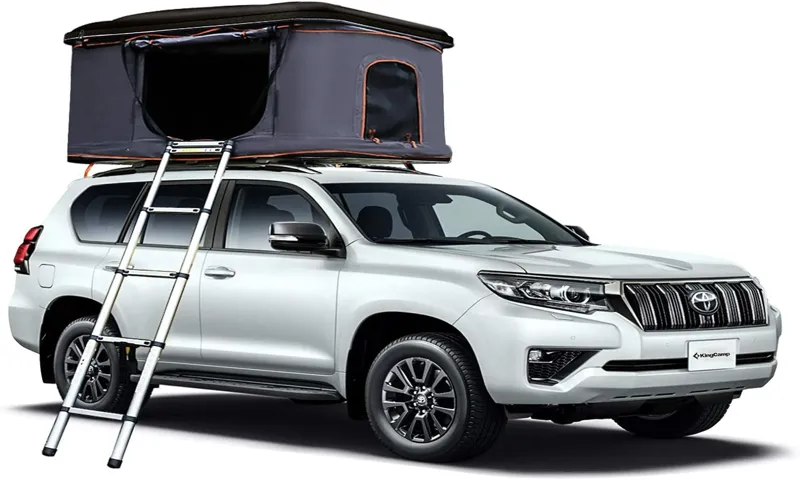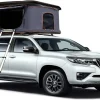Roof top tents have become increasingly popular among outdoor enthusiasts and adventurers. Offering a unique and elevated camping experience, these tents provide the convenience of setting up camp anywhere you can park your vehicle. But with their growing popularity, many people are wondering, are roof top tents safe? The answer to this question ultimately depends on various factors, such as the quality of the tent, proper installation, and responsible usage.
Just like with any other type of camping equipment, there are risks involved, but with the right precautions, roof top tents can be a safe and enjoyable option for outdoor enthusiasts. When it comes to safety, the quality of the tent is paramount. It is essential to invest in a reputable brand that uses high-quality materials and construction techniques.
A well-made roof top tent with robust stitching, durable zippers, and a sturdy frame will provide a safe and secure shelter. Proper installation is another crucial aspect to consider. The tent should be securely attached to the roof rack of your vehicle, following the manufacturer’s guidelines.
It is essential to double-check the tightness of the mounting system before hitting the road to ensure that the tent remains stable during transit. Additionally, responsible usage is key to ensuring the safety of roof top tents. It is essential to adhere to weight limits and occupancy guidelines provided by the manufacturer.
Overloading the tent or exceeding the number of intended occupants can compromise its structural integrity and put you at risk. Furthermore, using common sense and taking precautions while using a roof top tent can greatly enhance safety. This includes avoiding extreme weather conditions, such as heavy winds or storms, and setting up camp on level ground to prevent any accidental tipping or rolling of the tent.
In conclusion, roof top tents can be safe if the necessary precautions are taken. Investing in a high-quality tent, ensuring proper installation, and practicing responsible usage are key to enjoying a safe and comfortable camping experience. So, if you’re considering taking your camping adventures to new heights, rest assured that with the right precautions, roof top tents can provide a safe and memorable outdoor experience.
Table of Contents
Introduction
Are roof top tents safe? This is a common concern for many people who are considering camping with a roof top tent. The truth is, when used properly, roof top tents can be just as safe as traditional ground tents. Roof top tents are designed to be sturdy and secure, providing a comfortable and protected camping experience.
They are typically made with durable materials that can withstand various weather conditions, such as wind and rain. Additionally, roof top tents are installed on the top of a vehicle, which means they are elevated off the ground and safer from potential wildlife encounters. It is important, however, to ensure that the roof top tent is properly installed and secured to the vehicle.
Regular maintenance and inspections should also be conducted to ensure the tent is in good condition. Taking these precautions will help ensure a safe and enjoyable camping experience with a roof top tent.
Definition of Roof Top Tents
Roof top tents have become increasingly popular among outdoor enthusiasts and adventure seekers in recent years. But what exactly are roof top tents? Well, as the name suggests, these are tents that are designed to be mounted on the roof of a vehicle. They provide a convenient and comfortable sleeping space for campers while also offering the unique experience of sleeping off the ground.
Roof top tents are usually made from durable and weather-resistant materials, and they often come with features like built-in mattresses, built-in mosquito nets, and even awnings for extra shade and protection. These tents are easy to set up and pack away, making them a convenient choice for those who want to spend more time enjoying the great outdoors and less time fussing with traditional tents. Whether you’re camping in the wilderness or embarking on a cross-country road trip, a roof top tent can be a game-changer for your outdoor adventures.
So, if you’re looking for a new and exciting way to experience the outdoors, it might be time to consider investing in a roof top tent.

Overview of Roof Top Tents
Roof top tents have become increasingly popular among outdoor enthusiasts and travelers who want a comfortable and convenient way to camp. These tents are designed to be mounted on the roof of a vehicle, making them easy to set up and providing a safe and elevated sleeping space. With a roof top tent, you no longer have to worry about finding a flat and dry spot on the ground to pitch your tent.
Instead, you can simply drive to your desired camping spot, park your vehicle, and pop open your tent. It’s like having a portable hotel room on top of your car! Whether you’re going on a road trip, camping in the wilderness, or simply need a place to sleep during a long journey, a roof top tent is a practical and convenient solution.
Why People Choose Roof Top Tents
“Why People Choose Roof Top Tents” Introduction: When it comes to camping, there are many options for accommodation. From traditional tents on the ground to campervans and trailers, the choices are endless. However, in recent years, there has been a growing trend of people choosing roof top tents for their outdoor adventures.
These innovative tents mount directly onto the roof of a vehicle, providing a comfortable and convenient sleeping space. So why are more and more people opting for roof top tents? In this blog section, we will explore the reasons behind this trend and the benefits that these tents offer. Whether you’re a seasoned camper or a novice adventurer, you’ll soon see why roof top tents are becoming the go-to choice for camping enthusiasts around the world.
So let’s dive in and take a closer look at what makes these tents so special.
Safety Features of Roof Top Tents
When it comes to safety features, roof top tents have got you covered. These innovative camping shelters are designed with your well-being in mind. They are built to withstand extreme weather conditions and provide a comfortable and secure sleeping space.
One of the key safety features of roof top tents is their sturdy construction. They are made from durable materials such as aluminum or fiberglass, which can withstand heavy winds and rain. Additionally, roof top tents come with robust support systems, including reinforced frames and thick mattresses, ensuring stability and preventing accidents.
Another important safety feature is the inclusion of mosquito nets and zipper closures, which keep bugs and critters out of your sleeping area. Some roof top tents even have additional safety features like fire-resistant fabric and reflective strips, making them ideal for camping in remote areas. So, whether you’re hiking in the mountains or exploring the wilderness, you can rest easy knowing that roof top tents are designed with your safety in mind.
Durable Construction Materials
roof top tents, safety features, durable construction materials
Sturdy Ladder System
roof top tents, sturdy ladder system, safety features
Secure Mounting System
roof top tents, mounting system, safety features
Weather Resistance
roof top tents, safety features, weather resistance Are you an adventurer seeking a reliable shelter while exploring the great outdoors? Look no further than roof top tents, which offer a convenient and safe camping experience. One of the key safety features of roof top tents is their weather resistance. These tents are specially designed to withstand various weather conditions, ensuring that you stay protected and comfortable no matter what Mother Nature throws at you.
Whether it’s heavy rain, strong winds, or scorching heat, roof top tents are built to keep you dry and secure. The materials used in their construction are durable and waterproof, preventing any water from seeping through. Additionally, these tents are equipped with sturdy zippers and reinforced stitching, ensuring that they can withstand the harshest winds without tearing or falling apart.
So, when you’re out in the wilderness, you can have peace of mind knowing that your roof top tent will keep you safe and cozy, allowing you to fully enjoy your outdoor adventures.
Accident Statistics and Risks
Yes, roof top tents are generally safe when used properly and installed correctly. However, it is important to note that accidents involving roof top tents do occur. According to accident statistics, the most common accidents involving roof top tents are due to user error and improper installation.
For example, if the tent is not secured tightly to the vehicle or if the ladder is not properly attached, this could lead to accidents and injuries. Additionally, accidents can also occur if the weight capacity of the roof top tent is exceeded, as this can cause the vehicle to become unstable. It is important to carefully follow the manufacturer’s instructions and guidelines for installation and use to ensure safety.
Regular maintenance and inspection of the tent and its components is also crucial to prevent accidents and ensure safe usage. Ultimately, when used responsibly, roof top tents can provide a safe and comfortable camping experience.
Accident Statistics Involving Roof Top Tents
roof top tents, accident statistics, risks In recent years, the popularity of roof top tents has grown exponentially. These convenient and adventurous accessories have become a common feature on many outdoor enthusiasts’ vehicles, allowing them to sleep comfortably while exploring the great outdoors. However, with this rise in popularity comes a need to address the potential risks and safety concerns associated with roof top tents.
Accidents involving roof top tents do occur, and it’s important for users to be aware of the statistics and take necessary precautions. While accident statistics specific to roof top tents are not widely available, it’s important to recognize the potential risks and use caution when using these tents. One of the most obvious risks is the possibility of the tent detaching from the vehicle while in motion.
This can lead to serious accidents and injuries not only for the occupants of the vehicle but also for other drivers on the road. Therefore, it’s crucial to ensure that the roof top tent is properly secured to the vehicle and regularly inspected for any signs of wear or damage. Another risk to be aware of is the added weight that comes with a roof top tent.
These tents can add significant weight to the vehicle’s roof, potentially affecting its stability and handling. It’s important to carefully consider the weight limits of your vehicle and take appropriate measures to distribute the weight evenly. Additionally, driving at high speeds or in strong winds can also pose a risk, as the added height and weight of the roof top tent can make the vehicle more susceptible to tipping over or being impacted by strong gusts.
To minimize the risks and ensure a safe and enjoyable experience, it’s important to follow the manufacturer’s instructions and guidelines for installing and using a roof top tent. Regular maintenance and inspection of the tent and vehicle are also crucial to identify any potential issues before they become a safety hazard. Furthermore, it’s advisable to practice setting up and taking down the tent to become familiar with the process and minimize the chance of accidents or injuries.
While the thought of sleeping under the stars in a roof top tent is undoubtedly enticing, it’s essential to prioritize safety and make informed decisions. By being aware of the potential risks, following safety guidelines, and taking necessary precautions, outdoor enthusiasts can enjoy their adventures with peace of mind. So, before embarking on your next camping trip, be sure to consider the accident statistics and implement the necessary safety measures for a memorable and safe experience.
Common Risks Associated with Roof Top Tents
roof top tents, accident statistics, risks
Safety Tips for Using Roof Top Tents
When it comes to safety, using a roof top tent can be a great option for camping, but it is important to take certain precautions. Firstly, make sure you choose a roof top tent that is suitable for your vehicle and can handle the weight capacity. It is also crucial to properly install the tent according to the manufacturer’s instructions.
Additionally, always check the weather conditions before setting up your tent, as strong winds can be dangerous. When inside the tent, it is essential to distribute the weight evenly and avoid overloading one side. Lastly, always make sure to securely fasten the ladder and zip up the tent properly to prevent any accidents during the night.
By following these safety tips, you can enjoy a safe and comfortable camping experience with a roof top tent.
Proper Installation and Maintenance
Roof top tents have become increasingly popular among outdoor enthusiasts, providing a convenient and comfortable way to camp. However, proper installation and maintenance are crucial to ensure safety. When installing a roof top tent, it is important to follow the manufacturer’s instructions carefully.
This includes properly securing the tent to the vehicle and ensuring that the roof rack can support the weight. Regular maintenance is also essential to keep the tent in good condition. This includes checking for any signs of wear or damage, such as tears or loose stitching, and addressing any issues promptly.
It is also important to regularly clean the tent and make sure that all zippers and closures are in working order. By taking the time to properly install and maintain your roof top tent, you can enjoy a safe and comfortable camping experience.
Weight Capacity and Distribution
roof top tents Are you planning a camping trip and thinking about using a roof top tent? If so, it’s important to keep some safety tips in mind to ensure a smooth and enjoyable experience. One crucial aspect to consider is the weight capacity and distribution of your roof top tent. These tents are designed to be mounted on the roof of your vehicle, so it’s essential to make sure that your vehicle can handle the extra weight.
Check the manufacturer’s recommendations for the maximum weight capacity of your specific roof top tent model and make sure that your vehicle’s roof rack can support that weight. Additionally, pay attention to the distribution of the weight within the tent. Make sure that the weight is evenly distributed to avoid putting too much strain on one side of your vehicle.
This will help maintain stability and prevent any accidents or damage while driving. So, before you set off on your adventure, take the time to properly assess the weight capacity and distribute the weight evenly to ensure a safe and comfortable camping experience.
Wind and Weather Conditions
roof top tents, safety tips, wind and weather conditions. When using a roof top tent, it’s important to consider the wind and weather conditions to ensure your safety and comfort. One of the first things to think about is the strength of the wind.
Strong winds can pose a hazard to your tent, especially if it’s not properly secured. Before setting up your tent, make sure to check the weather forecast and avoid camping in areas with high wind advisory. Additionally, if you find yourself in a windy area, always remember to use your tent’s guy lines and pegs to secure it to the ground.
This will help prevent your tent from being blown away or damaged. Another important consideration is rain or snow. While most roof top tents are designed to withstand light showers, heavy rain or snow can pose a challenge.
It’s always a good idea to pack a waterproof tarp or rainfly to provide extra protection against the elements. Lastly, be mindful of thunderstorms and lightning. In these situations, it’s best to seek shelter in a sturdy building rather than staying in your roof top tent.
Always prioritize your safety and stay informed about any weather alerts or warnings in the area you plan to camp. By taking these safety tips into account, you can enjoy a comfortable and worry-free camping experience with your roof top tent.
Securing Your Gear
When embarking on an adventure with a roof top tent, it’s important to prioritize safety and take the necessary steps to secure your gear. One of the best safety tips for using roof top tents is to ensure that your gear is properly fastened and tied down. This will prevent any unexpected movement or shifting while on the road, ensuring that your equipment stays in place and doesn’t pose a risk to you or others.
Additionally, it’s essential to regularly check the condition of your roof top tent and its components, such as the straps and roof rack. This will help identify any potential issues or wear and tear that could compromise its safety. By staying vigilant and taking necessary precautions, you can enjoy your roof top tent adventures with peace of mind and make unforgettable memories.
So, next time you head out on the open road, don’t forget to secure your gear properly and prioritize safety!
Conclusion
Are rooftop tents safe? Absolutely! In fact, they’re so secure that even the birds envy their lofty abodes. These tents provide a whole new level of camping confidence, making you feel like a modern-day Tarzan (or Jane!) swinging above the forest floor. Plus, with their sturdy construction and advanced materials, these tents prove that being high up can both be thrilling and safe.
So, next time you’re planning a camping trip, don’t be afraid to reach for the skies and experience the ultimate adventure in a rooftop tent. Just be sure to keep your head in the clouds and your feet firmly anchored to the ground!”
FAQs
Are roof top tents safe in windy conditions?
Yes, most roof top tents are designed to withstand strong winds. However, it is important to properly secure the tent and use additional measures, such as guy ropes or storm straps, to further enhance stability.
Can roof top tents withstand heavy rain?
Yes, roof top tents are typically made from waterproof materials and designed to keep occupants dry in rainy conditions. Some tents even come with a rainfly or additional waterproofing features for added protection.
Are roof top tents secure from wildlife?
While roof top tents provide an elevated sleeping area, they are not completely impervious to wildlife. It is recommended to properly close all openings and utilize a mosquito net or mesh to prevent insects or small animals from entering. Larger wildlife may still pose a potential risk, and it is advisable to camp in areas where such encounters are less likely.
Are roof top tents safe in hot weather?
Roof top tents can be comfortable in hot weather if proper ventilation is available. Many tents come with windows, mesh panels, or vents to promote airflow and minimize heat buildup. Additionally, using reflective covers or awnings can provide shade and help regulate temperature inside the tent.
How do roof top tents handle snow?
Roof top tents are generally not recommended for heavy snowfall or extreme winter conditions. The weight of the snow can pose a safety risk and may cause damage to the tent or vehicle. It is advisable to use alternative camping setups, such as ground tents or winter-specific shelters, in snowy environments.
Can roof top tents be used on any vehicle?
Roof top tents can be installed on most vehicles with a suitable roof rack or mounting system. However, it is important to check the weight limits and compatibility of both the tent and the vehicle to ensure safe and secure installation. It is also recommended to consult the manufacturer’s guidelines and seek professional advice if needed.
How safe are roof top tents during travel?
Roof top tents are designed to be securely attached to the vehicle during travel. However, it is important to regularly inspect and maintain the mounting system to ensure that the tent remains stable and secure. Adhering to speed limits and safe driving practices is also crucial to minimize any potential risks or hazards.



